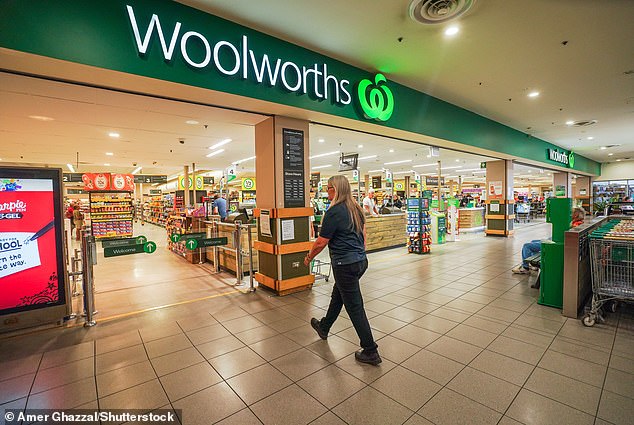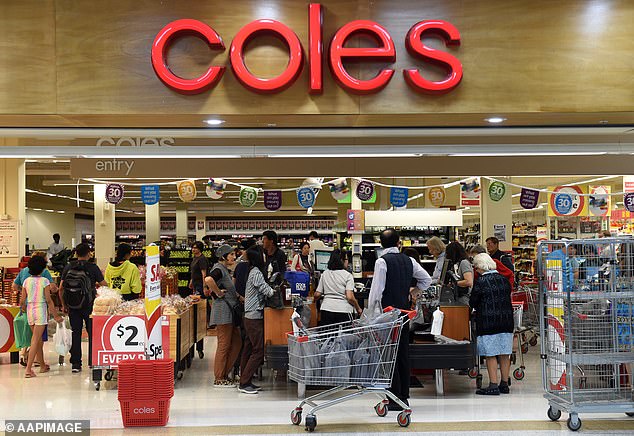Anthony Albanese backs new supermarket chain to challenge Australian ‘duopoly’
Prime Minister Anthony Albanese has said he supports the idea of a new supermarket chain entering the market to boost competition in the country.
Coles and Woolworths were ordered to face a Senate inquiry into whether customers were subjected to ‘price gouging’ during the cost of living crisis.
The Federal Senate Inquiry, which was established in December last year, is examining the impact of market concentration on food prices and the pattern of pricing strategies used by supermarket chains.
Mr Albanese told ABC Radio on Friday that there are a small handful of supermarkets that “very clearly” have “excessive market power”.
Prime Minister Anthony Albanese claimed Coles and Woolworths had “excessive market power” and flagged measures to encourage new supermarket entrants to Australia to boost prices and competition.
“We effectively have a duopoly in large parts of Australia,” he said.
‘In some places IGA or Aldi or other supermarkets will play a role, but in the vast majority there is a concentration of power and that is why there are at least three investigations underway at the moment.
“We know that when farmers say they are getting less for their produce, it hasn’t necessarily translated into lower prices at the checkout.”
The Prime Minister ruled out a forced break-up of Coles and Woolworths but highlighted measures encouraging new arrivals in Australia.
He explained that the measure could lead to new entrants working with states to limit other players’ ability to “land bank” new supermarkets and block or thwart new supermarkets.
“Well, we will certainly look at any recommendations that come forward on how you might encourage new entrants into the market,” he said.
‘That would of course be useful. The more competition, the way the economy should work, it should naturally lead to lower prices as people compete.
‘In many places there is of course no duopoly, but in some smaller markets there is a monopoly. However, the key is also this voluntary code of conduct, where there should be some mandate.’
Earlier on Friday, NDIS and Public Services Minister Bill Shorten told Today host Karl Stefanovic that Labor would not break up Coles and Woolworths.
“We’re not going to break up Coles and Woolworths, but it’s Labor who said enough is enough with the price rises,” Shorten said.
“I think I’ve been on your show six or seven times and said Coles and Woolies need to be accountable.
‘I want them to offer better price competition. We will do whatever it takes… We just want to make sure Coles and Woolworths don’t rip people off.”

Woolworths (pictured) and Coles were ordered to face a Senate inquiry into whether customers were subjected to ‘price gouging’ during the cost of living crisis. In its submission, Woolworths said it had taken steps to offer affordable groceries
Opposition finance spokeswoman Jane Hume added that Shorten “had a point” but questioned why it took so long for the government to act.
‘Enough is enough. But why did it take two years to get to this point, Bill?’ said Mrs. Hume.
“(Albanians) could have done it a year and a half ago, because apparently the cost of living was number one a year and a half ago. There is undoubtedly work that can be done with the competition for the supermarkets.
‘Why is it that supermarkets, for example, are allowed to exploit land banks, which prevents competitors from entering the market? I think that’s something that should be pursued.”
In its contribution to the research, Coles said it recognized the cost of living pressures faced by Australian households.
“As one of Australia’s largest supermarkets, we take seriously our core role in providing essential goods to Australians,” the submission reads.
“We are always looking for ways to deliver value to our customers and strive to help reduce the cost of living.”
The supermarket giant said that while prices may have risen in stores across the country, the increase did not translate into bigger profits for the company – despite Coles reporting a net profit of $1 billion last financial year.

In its contribution to the research, Coles said it recognized the cost of living pressures faced by households, but said that while in-store prices rose, this increase did not translate into profits.
Woolworths said in its submission that a rise in food prices was driven by cost increases from partners, suppliers and “cyclical impacts on fresh food markets”.
‘We are very aware of our responsibility to strike a balance between providing value for our customers, paying our suppliers fairly for the goods they supply to us, providing security and meaningful employment for our team and delivering sufficient returns for our shareholders,” Woolworths said.
“Australians are right to demand a food sector that both delivers compelling consumer value every day and ensures a sustainable, innovative and competitive industry.”
Woolworths said it has taken steps to offer affordable groceries through weekly deals and offering its own brand products at low prices.
The retailer added that it was confident prices would fall as global forces responsible for higher supply chain and raw material costs recede.
